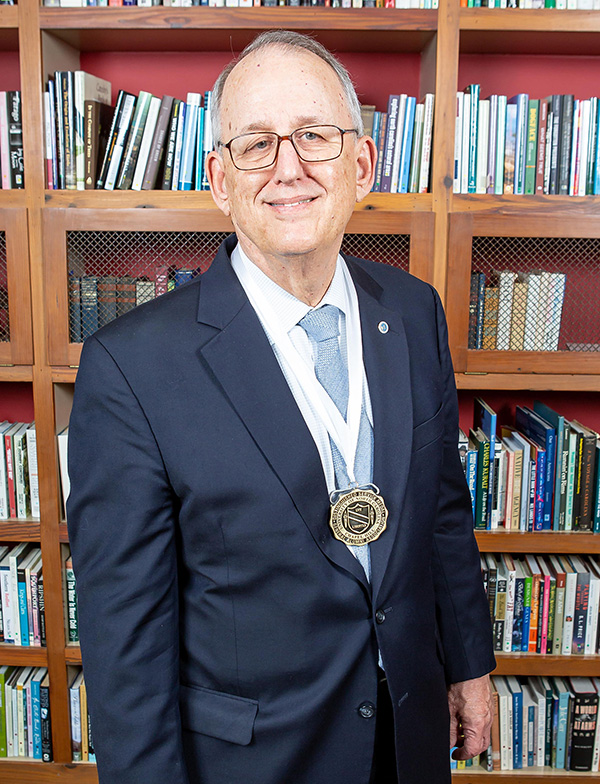Douglas S. Dibbert '70, Distinguished Service Medal Citation
Posted on June 13, 2023
Doug Dibbert ’70 (photo: Marlon Headen ’95)
You have to walk fast to keep up with Doug Dibbert ’70. He has places to go and long legs to get him there. Keeping up is a constant challenge, companions say. And not just with his speed.
Dibbert, in his nearly 41 years at the helm of the General Alumni Association, has created a legacy. He hit the ground running in 1982, when the GAA Board of Directors hired him as director of alumni affairs (now president of the alumni association). Until then, his career had been in politics, working for U.S. Senate and House members and managing political campaigns. That experience in the relationship business translated well to his work with alumni.
Leaving behind Capitol Hill, Dibbert settled into his office in the Carolina Inn Apartments, shared by a staff of 17, who set file cabinets atop plywood-covered bathtubs in the dozen apartments jerry-rigged into workspaces. In short order he was approached by a trio of former alumni association leaders, hopeful that he would lead the way to a new building for the association. They proudly noted they’d raised the first $35,000. Dibbert estimated the cost of the initial scope of the project to be about $7 million. He got to work, and in 1993 he cut the ribbon on the 63,000-square-foot George Watts Hill Alumni Center. Right away it began filling up with memorabilia and Carolina artifacts.
Holding onto mementos is baked into the GAA’s culture. Reunions are built on helping alumni remember when they were young. Dibbert has diligently added to that culture and to the GAA’s collection. What couldn’t go on a shelf stays in his sharp memory: names, dates, facts, scores, what was tried 20 years ago and why it didn’t work. “He’s the walking, talking history of this place,” a colleague said.
As one of the longest-serving administrators in campus history, Dibbert has generously mentored leaders at UNC and elsewhere. He networked extensively with other universities and brought home the best of their ideas and experiences. His broad knowledge was invaluable when he served on the Knight Commission on Intercollegiate Athletics, which ultimately instituted reforms to athletics and restructured the NCAA.
Early on, Dibbert realized students who had positive college experiences were more likely to stay engaged with the University as alumni. Under his leadership, the GAA took on sponsorship of the Clef Hangers, Loreleis and senior marshals, and established a student alumni association. He led the GAA’s efforts to provide vital support to the Black Alumni Reunion shortly after it formed. It’s now Carolina’s largest affinity reunion.
Dibbert recognized the importance of the GAA’s magazine to connect with alumni, and he dedicated time to reshaping a quarterly journal and five-times-a-year tabloid into what is today’s Carolina Alumni Review. The magazine and GAA membership and programs have won more than 130 awards from the Council for Advancement and Support of Education, an international professional association serving educational institutions and advancement professionals. He also served as CASE’s board chair from 1997 to 1999, and in 2015, CASE honored Dibbert with its Frank L. Ashmore Award for service.
Under Dibbert’s leadership, the GAA moved into the digital world. The association launched its website, which has expanded to more than 15,000 pages, with educational sessions, news reports and the Review’s issues from 1912 to the present posted online. Staff have taken full advantage of social media and email to keep alumni informed and connected. Alumni records — more than 437,000 — have been digitized. The Tar Heel Travel Program expanded, with faculty added as enrichment lecturers. Alumni career services were offered. Programs staff now provide dozens of special engagement opportunities to Carolina alumni in the Triangle and worldwide. Scholarships also were formed, including the Light on the Hill Society for Black students, the GAA and Dibbert Scholars, and the Lieutenant Colonel Bernard W. Dibbert Carolina Covenant Scholarship for Military Families. GAA membership has more than doubled since Dibbert took the helm.
From his experience on Capitol Hill, Dibbert understood the necessity of building relationships with lawmakers. He helped organize the Tar Heel Network, which creates opportunities for alumni to talk with elected officials — and conversations that lead to legislation that benefits the University.
Part of Dibbert’s effectiveness has been his determination to represent all alumni, accounting for their diverse backgrounds and beliefs. He has consistently stood for what he believed was best for alumni and the association. When disgruntled alumni ask why the magazine covers tough issues, his response has been: Because the University has to deal with them.
Dibbert has never hesitated to take on tough tasks. He has showed up at hospital bedsides and at sporting events of teams not in the limelight, and has helped thousands of alumni mark the passing of loved ones. He has written letters to alumni whose children were not admitted to Carolina along with those who were. He never missed a GAA Board of Directors meeting — until a family event this year usurped one. He has been the public face for alumni when tragedy struck, including 9/11 and the 2008 murder of Student Body President Eve Carson ’08.
While each of Dibbert’s three predecessors made their mark, Dibbert elevated the GAA to a more sophisticated and better defined organization with a high attention to detail. He has always seen a bigger picture, and he has an innate ability to size up complex situations and develop plans to deal with them.
“Doug gets this place,” a colleague said. “He’s the captain of the team of those who get this place.”
So Doug Dibbert now strides forward into retirement, having time for his favorite hobby, which, he says, is mowing his lawn. Likely he will do so at a brisk pace.
The Distinguished Service Medal is presented by the GAA Board of Directors.
